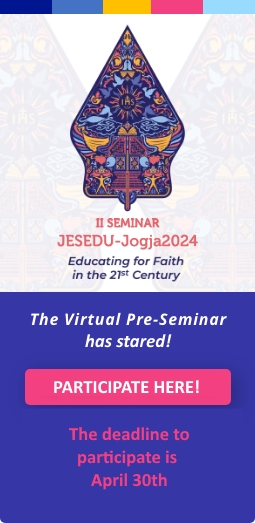The 2021 Jesuit schools Colloquium was unlike any other conference I have experienced before. First, it was global, and involved real-time direct interaction with participants from around the world. Second, it was online, and so even though technology allowed us to connect with far-off regions, the conversations were not in-person, but through Zoom, and so we were both in touch with one another and somehow removed from one another as well.
The conference themes were (1) Educating for Faith, (2) Educating for Depth, (3) Educating for Reconciliation, and (4) Educating for Global Citizenship. There were eight preliminary talks, two on each theme, to be viewed prior to the conference itself. While I found all of the talks interesting and valuable, two in particular stood out for me in the way they provided new and inspiring insights on Jesuit education.
Fr. Elias Lopez, SJ’s talk on Educating for Reconciliation, for example, showed how the Universal Apostolic Preferences (UAPs) may be re-envisaged as the different ways we can be reconciled with others and with the world around us. The first UAP can be seen as reconciliation with God, the second and third with the marginalized and with youth, and the fourth with creation. Fr. Lopez also highlighted the importance of the family as the place where we learn about unconditional love, the kind of love that parents have for children. He noted that this love is akin to that which is shown in the decision to forgive. He pointed out that forgiveness is the hallmark of a Jesuit or Ignatian classroom, since without forgiveness there is no justice, and without justice there is no reconciliation. The Ignatian school, therefore, may be a sort of spiritual incubator of healing and restorative justice. With this approach, our network of schools, he claims, could therefore help to heal a broken world. I found Fr. Lopez’s comments thought-provoking, and they gave me both motivation and hope for the mission of my school, and for Jesuit schools in general.
Ms. Margaret Silf’s talk also inspired me. Ms. Silf challenged educators to consider the importance of guiding students in understanding the importance of taking action and making choices based on love. She asks us to trust our students to reflect deeply on their own questions and desires, to better understand where their lives are truly centred, and to find deeper truths within themselves. She reminded us not to be put off by the chaotic nature of modern times, noting that chaotic moments can also be creative ones, since new life, as in the paschal mystery, often emerges from chaos and brokenness, providing a better way forward in response to the challenges of the day. Both Fr. Lopez and Ms. Silf underlined the importance of the decision to love in our relationships and actions, to help heal our broken world. We are encouraged in our schools to guide our students in the deep reflection and authentic reconciliation that will help them to live lives based on love.
In addition to these two talks, I also very much enjoyed the opportunity to speak with representatives of Jesuit schools from around the world, in a small group discernment circle. In my group, there were reps from Canada, Zimbabwe, India, Malta, and the United States. I was amazed by how much we had in common. When asked to prioritize the conference themes, however, we struggled to tell which were the most important. All four themes seemed valuable to us, and we found the themes to be interrelated. In my own context, Canada, reconciliation seems foremost, because we have much work to do in this area with respect to the indigenous peoples here. I shared this with other representatives of Canadian Jesuit schools when we met for our small group regional discussions afterward. In the end, we agreed that our sense of community – locally, regionally, and globally – the desire to reconcile with others and with our planet, and our shared mission around these priorities, informed very well our collective and renewed commitment to our work in each of our Jesuit schools.

